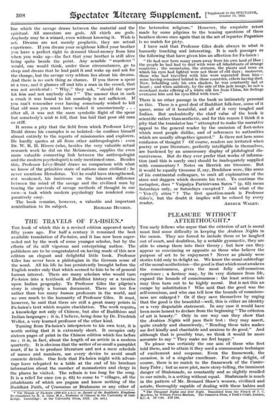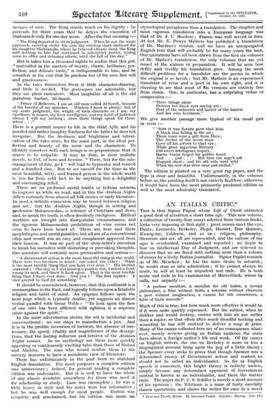PLEASURE WITHOUT AFTERTHOUGHT.*
THE surly fellows who argue that the criterion of art is moral must find some difficulty in keeping the Arabian Nights in the canon. They are forced to include them or be laughed out of court, and doubtless, by a notable gymnastic, they are able to cramp them into their theory ; but how can they appear so convincing or apposite as those who believe the purpose of art to be enjoyment ? Never so plainly were stories told only to delight us. We know the usual subterfuge of the moral-aesthetician—the good is that which most awakens the consciousness, gives the most fully self-conscious experience ; a fantasy may, by its very distance from life, expand the bounds of consciousness : the least serious tale may thus turn out to be highly moral. But is not this an escape by substitution ? Who said that the good was the self-conscious, and who can tell how the bounds of conscious- ness are enlarged ? Or if they save themselves by urging that the good is the beautiful—well, this is either an identity or a very disputable statement. In any case it would have been more honest to declare from the beginning "The criterion of art is beauty." Only in one way can they show that the Arabian Nights will pass their test : they may assert, quite crudely and shamelessly, "Reading these tales makes me feel kindly and charitable and anxious to do good." And although that is possibly true, we think it would be more accurate to say "They make me feel happy."
To please was certainly the one aim of those who first told them, and to attain it they used a consummate technique of excitement and suspense. Even the framework, the occasion, is of a singular excellence. For deep delight, of course, there is no match to the framework of the Canter- bury Tales ; but as mere plot, mere story-telling, the imminent danger of Shahrazade, so constantly and so slightly recalled to our minds, is a setting without equal. Shaluuza.de is much in the pattern of Mr. Bernard Shaw's women, civilized and astute, thoroughly capable of dealing with these babies and • -The Thousand Nights and One Night. Translated from the French of J. C. Mardrus, by William Powya blathers. The Casanova Press, 4 Took's Court, London, E.C. 4, 16 vols. 216 168.
savages of men. The King stands much on his dignity : he pretends for three years that he delays the execution of Shahrazade only for one day more. After the first morning :—
"The King departed to sit in judgment. When he saw the wazir approach, carrying under his arm the winding sheet destined for his daughter Shahrazado, whom he believed already dead, the King said nothing to him but continued to administer justice, raising some to office and debasing others, until the fall of the day."
But it takes him a thousand nights to realize that this girl, "unrivalled in the matters of beauty, charm, brilliance, per- fection, and delicate taste," is indispensable to him, and he considers in the end that he pardons her of his own free will and graciousness.
In the tales themselves there is little character-drawing, and little is needed. The grotesques are admirable, but they are plain caricature. Most laughable of all is the old garrulous barber, Al-Samit.
"Prince of Believers, I am an old man called Al-Samit, because of the brevity of my speeches. Wisdom I have in plenty; but of my acute judgment, the weight of such discourse as I use, my excellence in reason, my keen intelligence, and my habit of judicious silence I will say nothing ; since these things speak for them- selves . . ."
There is a portrait nearer to life in the child Ajib, and his puzzled and rather haughty fondness for the father he does not recognize. But the freshness and brightness and intoxi- cation of the tales rests, for the main part, in the ideal per- fection and beauty of the scene and the characters. To identify ourselves with such beings is so preposterous that it ceases to be culpable. It may be that, in more realistic novels, to feel, of hero and heroine, "There, but for the mis- management of fate, go I" will lead to hypocrisy and conceit and a hundred sins. But to see oneself for the time as the most beautiful, witty, and learned person in the whole world is too far from cold fact to be anything but a delightful and encouraging relief.
There are no profound moral truths or tedious sermons to improve us while we read, and. in this the Arabian Nights differs curiously from almost all folk stories or early literature.
In most a definite connexion may be traced between religion and art ; but the Arabian Nights, though in setting and r-rofession Mohammedan, is tolerant of Christians and Jews, and, to speak the truth, is often decidedly irreligious. Biblical worthies are brought into disreputable circumstances, and the rigorous Mohammedan prohibition of wine seems not even to have been heard of. There are here and there apophthegms and moral parables, but all are of a conventional ethic and would win an easy and complacent approval from their hearers. It was no part of the story-teller's intention to break his narrative with disturbing or provoking thoughts. One anecdote will certainly seem provocative and serious :— • "A disinterested action is the most beautiful thing in the world. There were two brothers in Israel ; one asked the other : 'What is the most terrible thing that you have ever done ? ' His brother answered : 'One day as I was passing a poultry run, I seized a fowl, wrung its neck, and threw it back again. That is the most terrible thing that I have ever done. And you I' The first replied : I once prayed to God for something.'"
It should be remembered, however, that this sentiment is a commonplace in the R-Lst, and logically follows upon a fatalistic religion and habit of mind. An epigram follows upon the next page which is typically Arabic, yet suggests an almost verbal parallel with Oscar Wilde : "To look upon the face of one who has been afflicted with ugliness is a supreme crime against the spirit."
In the more adventurous stories the wit is incidental and conversational ; no one stays to manufacture a jest. And It is in the prolific invention of incident, the absence of irre- levance, the speed, vitality and magnificence of the descrip-
tions, that the lasting influence and interest of the Arabian Nights consist. In no mythology are there more quickly
appealing or continuously exciting tales than those of Sinbad and Aladdin. The man who would confine them to the nursery deserves to have a moralistic view of literature.
There has unfortunately in the past been no standard English translation. For most purposes a complete edition was unnecessary ; indeed, for general reading a complete edition was undesirable. But it is well to have the whole of any classic available somewhere for those who need it for scholarship or study. Lane was incomplete ; he 'was a little heavy in style and his notes were too informative ; but he was well enough for most people. Burton was c.:7nplete and unashamed, but his edition was more an
etymological paraphrase than a translation. The simplest and most vigorous translation into a European language was that of Dr. J. C. Mardrus ; France was well served in hire. At last Mr. E. Powys Mathers has published a translation of Dr. Mardrus's version, and we have an unexpurgated English text that will probably be• for many years the best. Our quotations have all been drawn from the first six volumes of Mr. Mather's translation, the only volumes that are yet issued of the sixteen in preparation. It will be seen how deftly and vividly his translation goes. Among the most difficult problems for a translator are the poems in which the original is so lavish ; but Mr. Mothers is an experienced translator of verse and a poet in his own right, and it is cheering to see that most of Ms versions are entirely free
from strain. One, in particular, has a surprising virtue of compression :—
" Three things alone
Prevent her black eyes saying yes : Fear of the unknown and horror of the known And her own loveliness."
We give another passage more typical of his usual gait in verse :—
" ' Sure it was Saturn gave that hair,
A black star falling in the air ; Those roses were a gift from Mars ; The Archer of the seven stars Gave all his arrows to that eye ; While great sagacious Mercury Did sweet intelligence impart, Queen Venus forged his golden heart And . . . and . . .' But here the sage's art Stopped short ; and his old wits went wild When the new star drew near and smiled."
The edition is printed on a very good rag paper, and the type is clear and beautiful. Unfortunately, in the volumes before us,the printing itself is not entirely faultless ; otherwise it would have been the most pleasantly produced edition as well as the most admirably translated.



























































 Previous page
Previous page